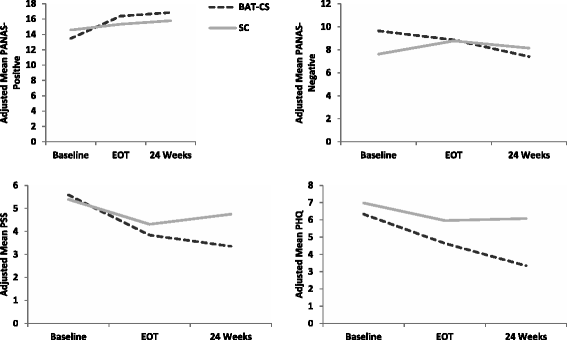Behavioral activation for smoking cessation and mood management following a cardiac event: results of a pilot randomized controlled trial
- PMID: 28415979
- PMCID: PMC5392972
- DOI: 10.1186/s12889-017-4250-7
Behavioral activation for smoking cessation and mood management following a cardiac event: results of a pilot randomized controlled trial
Abstract
Background: Smoking cessation following hospitalization for Acute Coronary Syndrome (ACS) significantly reduces subsequent mortality. Depressed mood is a major barrier to cessation post-ACS. Although existing counseling treatments address smoking and depression independently in ACS patients, no integrated treatment addresses both. We developed an integrated treatment combining gold standard cessation counseling with behavioral activation-based mood management; Behavioral Activation Treatment for Cardiac Smokers (BAT-CS). The purpose of this pilot randomized controlled trial was to test feasibility, acceptability, and preliminary efficacy of BAT-CS vs. Standard of Care (SC).
Methods: Participants were recruited during hospitalization for ACS and were randomly assigned to BAT-CS or SC. The nicotine patch was offered in both conditions. Smoking, mood, and stress outcomes were collected at end-of-treatment and 24-week follow-up.
Results: Fifty-nine participants (28 BAT-CS, 31 SC) were recruited over 42 weeks, and assessment completion was above 80% in both conditions. Treatment acceptability and fidelity were high. At 24 week follow-up adjusted odds ratios favoring BAT-CS were 1.27 (95% CI: 0.41-3.93) for 7-day point prevalence abstinence and 1.27 (95% CI: 0.42-3.82) for continuous abstinence. Time to first smoking lapse was significantly longer in BAT-CS (62.4 vs. 31.8 days, p = 0.03). At 24-weeks, effect sizes for mood and stress outcomes ranged from η2partial of.07-.11, with significant between treatment effects for positive affect, negative affect, and stress.
Conclusions: The design of this study proved feasible and acceptable. Results provide preliminary evidence that combining behavioral activation with standard smoking cessation counseling could be efficacious for this high risk population. A larger trial with longer follow-up is warranted.
Trial registration: NCT01964898 . First received by clinicaltrials.gov October 15, 2013.
Keywords: Acute coronary syndrome; Behavioral activation; Cessation; Depression; Mood; Smoking.
Figures
References
-
- Centers for Disease Control Cigarette smoking among adults-United States, 2006. Morb Mortal Wkly Rep. 2007;56:1157–1161. - PubMed
Publication types
MeSH terms
Associated data
Grants and funding
LinkOut - more resources
Full Text Sources
Other Literature Sources
Medical




